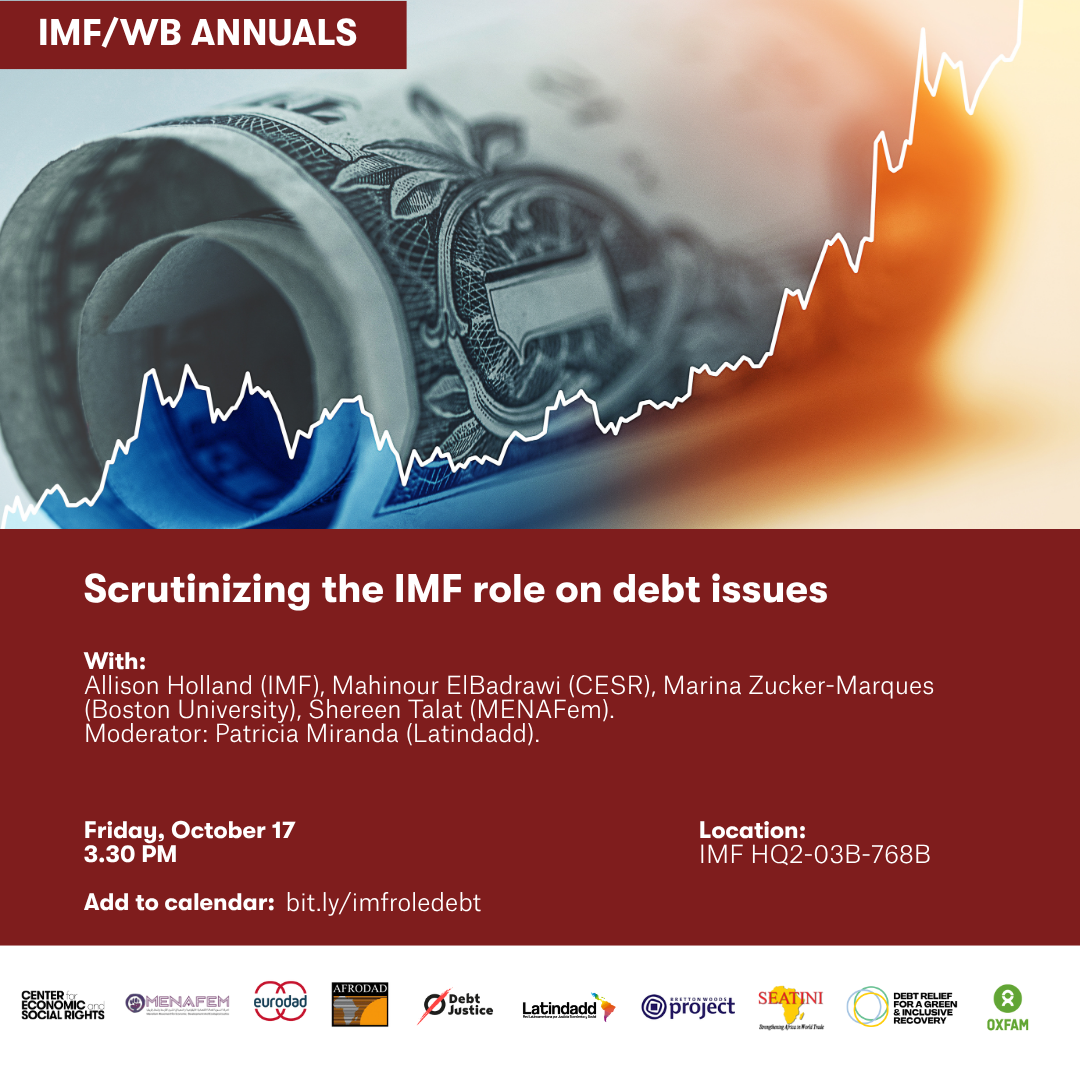As growing calls push to make global economic rules more just and accountable, this year’s IMF and World Bank Annual Meetings bring together finance ministers, central banks, and civil society to debate the future of the global economy. Through the Civil Society Policy Forum (CSPF), CESR and allies are working to ensure these discussions on debt, tax, and climate finance advance human rights, gender equality, and climate justice, both in Washington and online.
The 2025 Annual Meetings take place as governments reconsider how international cooperation should work across multiple reform processes. Debt, inequality, and climate breakdown are exposing deep flaws in the financial architecture created eight decades ago. The IMF and World Bank influence how countries fund public services, respond to crises, and pursue climate goals, yet their frameworks often prioritize creditor confidence over people’s rights and wellbeing.
CESR’s role is to connect the dots between the Seville Financing for Development (FfD4) outcomes, preparations for COP30 in Belém, and negotiations toward a UN Tax Convention in Nairobi, ensuring that international cooperation is guided by human rights, equity, and accountability.
Our sessions at the Civil Society Policy Forum (CSPF)
Tuesday, October 14
9:00 AM — Cross-institutional collaboration in times of multilateral fragmentation
Location: IMF HQ2-03B-768B
Organizers: Christian Aid, Human Rights Watch, CESR, Global Initiative for Economic, Social and Cultural Rights, OHCHR, MENAFEM, Bretton Woods Project, Eurodad, Recourse.
In a period of fragmenting multilateralism, this discussion looks at how IMF–UN collaboration can be strengthened to better reflect economic and social rights at country level.

4:30 PM — From Seville to the CSPF: reimagining IMF governance for a multilateralism fit for purpose
Location: IMF HQ2-03B-768B
Organizers: CESR, Equidad, Latindadd, MENAFEM, WEDO, Christian Aid, Akina Mama wa Afrika.
Description: Building on FfD4 outcomes, this session explores how feminist, regional, and civil-society perspectives can shape IMF and World Bank reform processes to embed rights-aligned, gender-responsive, and climate-just principles into global economic governance.
Wednesday, October 15
11:00 AM — Extreme wealth: how much is too much?
Location: WBG I 2-250
Organizers: Oxfam International, Patriotic Millionaires, ITUC, MENAFEM, CESR, Christian Aid, Latindadd, Bretton Woods Project, ICRICT, ANND, Norwegian Church Aid.
With the World Bank committing to address inequality, this session considers whether defining an “extreme wealth line,” similar to the poverty line, could drive just economic and fiscal policies.
Event page and stream | Add to calendar
Friday, October 17
3:30 PM — Scrutinizing the IMF role on debt issues
Location: IMF HQ2-03B-768B
Organizers: Eurodad, Latindadd, MENAFEM, SEATINI Uganda, Jubilee USA, AFRODAD, APMDD, Recourse, CESR, DRGR Project, Debt Justice UK, Oxfam, Bretton Woods Project, Debt Justice Norway.
This discussion examines how the IMF’s policies on debt restructuring and conditionality shape recovery prospects and how to move toward a transparent, rights-based, and participatory debt resolution framework.
What CESR and allies are pushing for:
-
IMF reform that upholds rights: integrate human rights, gender equality, and climate objectives into surveillance and program design.
-
Debt justice: support a UN framework convention on sovereign debt, a Global Debt Registry, a Borrowers’ Club, and an African Credit Rating Agency.
-
Climate finance that serves people and planet: move away from debt-creating models toward approaches grounded in equity, care, and reparations.
-
Fair taxation and reduced inequality: advance a UN Tax Convention and explore tools such as an extreme wealth line.
Key resources
To support our advocacy at the Annual Meetings, CESR and partners are sharing new and recent publications that set out practical pathways toward a Rights-Based Economy:


